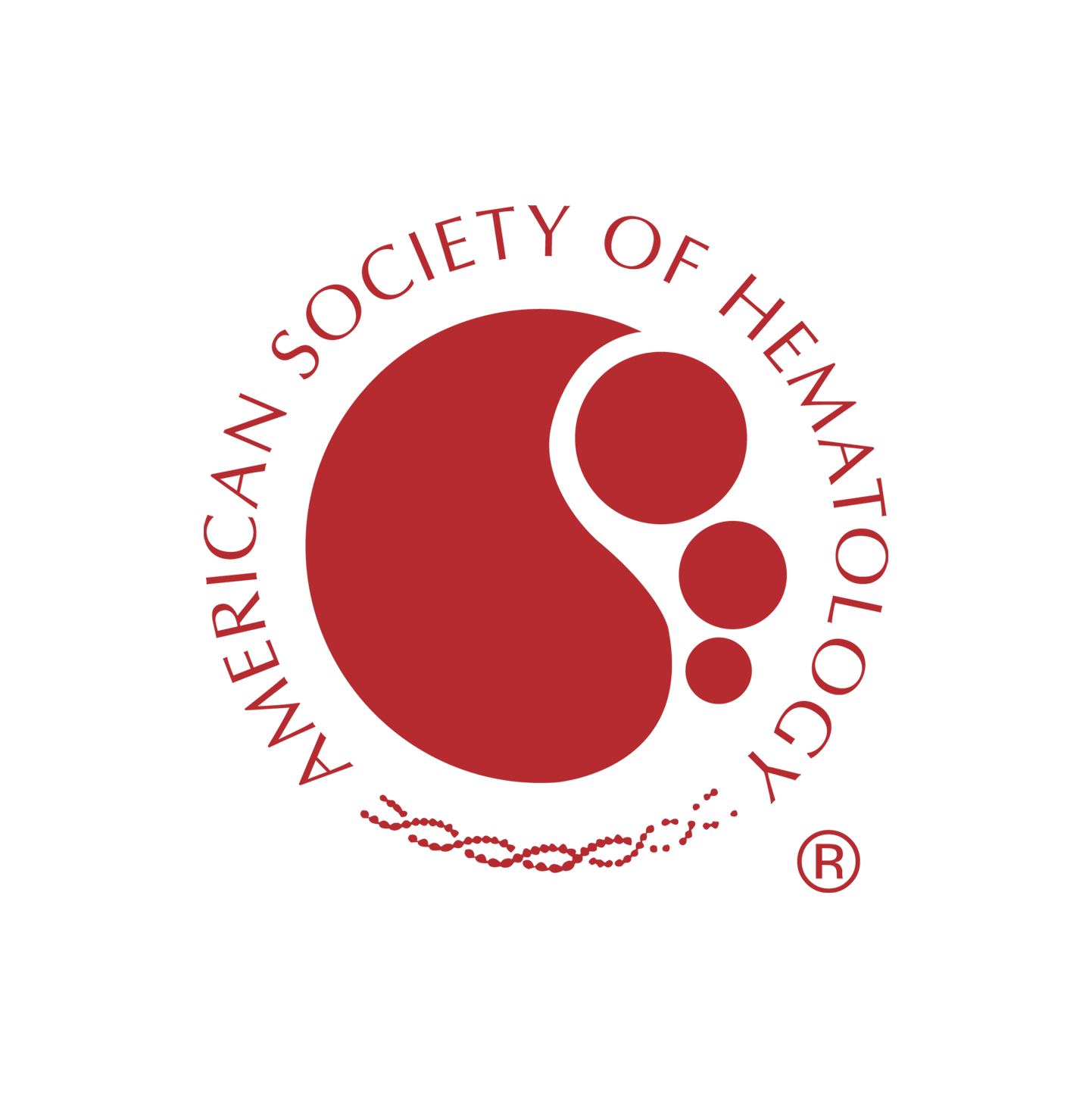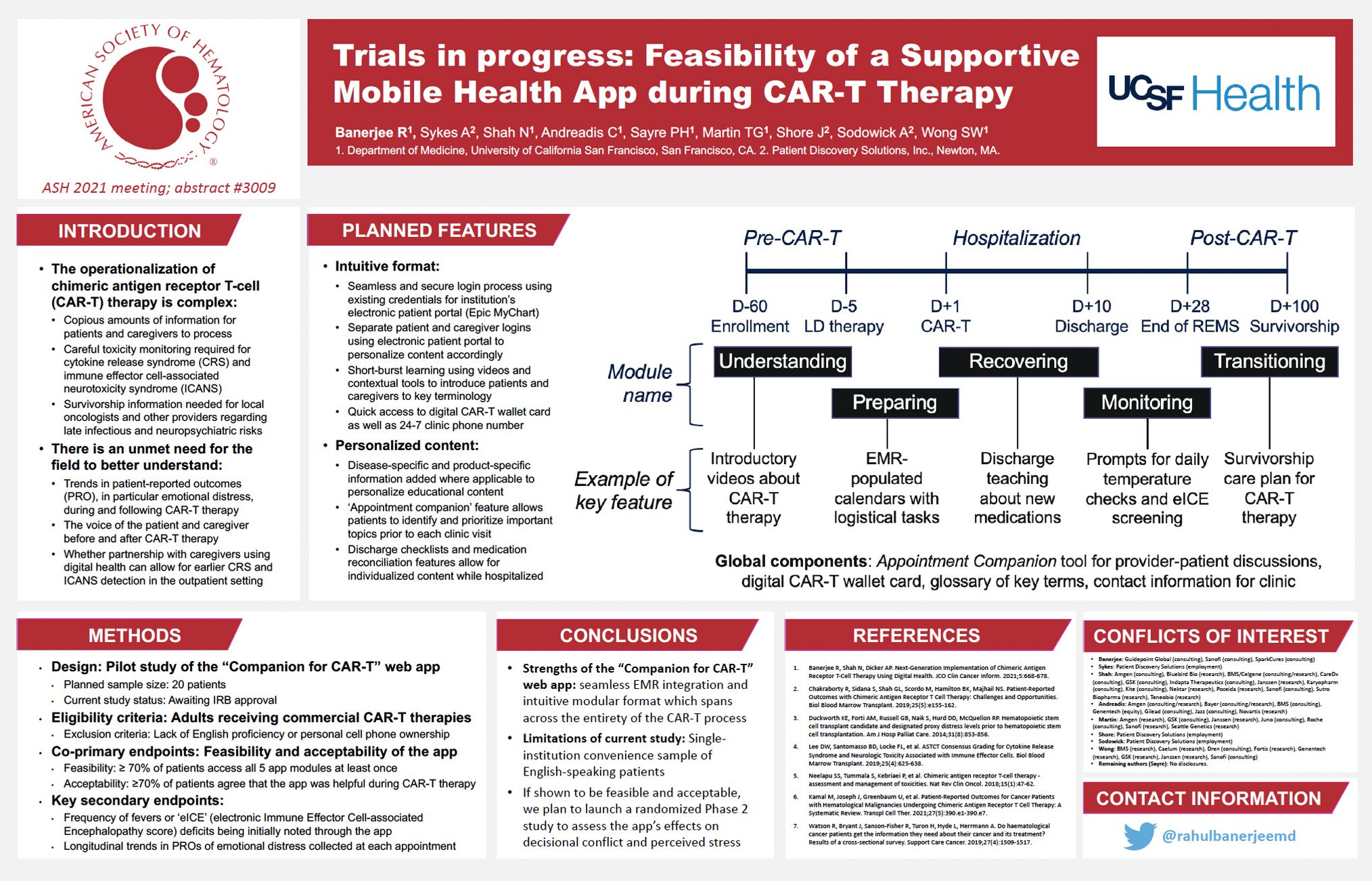UCSF Health and Patient Discovery present at ASH 2021
Feasibility of a Supportive Mobile Health App for Chimeric Antigen Receptor T-Cell Therapy
Session: 902. Health Services Research—Lymphoid Malignancies: Poster II
Hematology Disease Topics & Pathways: Technology and Procedures, Clinical Practice (e.g. Guidelines, Health Outcomes and Services, and Survivorship, Value; etc.)
Rahul Banerjee, MD1, Arabella Sykes, B.S.c2*, Nina Shah, MD1, Charalambos Andreadis, MD, MSCE1*, Peter H. Sayre, MD, PhD1, Thomas Martin, MD1, Jason Shore, MBA2*, Adam Sodowick2* and Sandy W. Wong, MD3
1 University of California San Francisco, San Francisco, CA
2 Patient Discovery Solutions, Inc., Newton, MA
3 Department of Medicine, University of California San Francisco, San Francisco, CABackground
The operationalization of chimeric antigen receptor (CAR-T) therapy for hematologic malignancies can be complex for patients and their caregivers. In the weeks before CAR-T therapy, patients must process large amounts of information and coordinate logistics involving caregivers, lodging, and transportation. Immediately following CAR-T therapy, patients must be monitored closely for toxicities such as cytokine release syndrome (CRS) and immune effector cell-associated neurotoxicity syndrome (ICANS). In the months following CAR-T therapy, patients may be referred back to local oncologists without a clear plan for managing potential late effects such as hypogammaglobulinemia or neuropsychiatric complications (Chakraborty 2021).
Mobile health (mHealth) apps may be able to improve the patient experience during CAR-T therapy by facilitating care coordination, home-based toxicity monitoring, and patient education (Banerjee 2021). By empowering patients and caregivers to better understand CAR-T therapy and actively participate in their care, mHealth tools may ultimately augment workflows for CAR-T clinics as well.
However, the feasibility and acceptability of such supportive mHealth apps during CAR-T therapy have not been established.
Study Design
We have designed a “Companion for CAR-T” mHealth app to assist with care coordination, toxicity monitoring, and patient education during CAR-T therapy. Key components of the app are summarized in the Figure. In brief, pre-CAR-T components include educational videos and dynamic calendars to assist patients with coordinating logistics. Post-CAR-T components include app-based prompts to input body temperature daily, an electronic Immune Effector Cell-Associated Encephalopathy (eICE) screening tool for ICANS that can be administered by caregivers, and a patient-specific long-term survivorship care plan. Global app components include an ‘Appointment Companion’ to facilitate patient-provider discussions during appointments as well as a digital CAR-T wallet card to convey key health-related information to other healthcare providers.
We plan to investigate the “Companion for CAR-T” app through a pilot study of 20 patients receiving commercially available CAR-T therapies for any hematologic malignancy at our institution. Co-primary endpoints include (1) app feasibility, defined as the percentage of patients who access all 5 core modules shown in the Figure at least once; and (2) app acceptability, defined as the percentage of patients who agree that the app was helpful during their experience with CAR-T therapy.
Secondary endpoints include the incidence of fevers or eICE deficits recorded via the app.
Exploratory endpoints include longitudinal trends in patient-reported outcomes such as emotional distress at each clinic visit.
Discussion
If feasibility and acceptability of the “Companion for CAR-T” app are demonstrated through this pilot study, we plan to launch a multi-center randomized Phase 2 study of this mHealth tool versus usual care to assess its effect on perceived stress and decisional conflict. Other important steps for our group include the translation of app content into different languages and the provision of tablet computing devices for patients who do not own smartphones. Once validated and expanded in these aforementioned ways, potential strengths of the “Companion for CAR-T” app include its ability to be personalized easily with information specific to individual CAR-T therapies, malignancies, and centers.
Disclosures
Banerjee: Sanofi: Consultancy; SparkCures: Consultancy; Pack Health: Research Funding. Sykes: Patient Discovery Solutions, Inc.: Current Employment. Shah: Amgen: Consultancy; Indapta Therapeutics: Consultancy; Sutro Biopharma: Research Funding; Sanofi: Consultancy; Teneobio: Research Funding; Precision Biosciences: Research Funding; Poseida: Research Funding; Karyopharm: Consultancy; Janssen: Research Funding; GSK: Consultancy; Kite: Consultancy; Nektar: Research Funding; Oncopeptides: Consultancy; CSL Behring: Consultancy; Bluebird Bio: Research Funding; BMS/Celgene: Research Funding; CareDx: Consultancy. Andreadis: Incyte: Honoraria; Roche: Current equity holder in publicly-traded company, Ended employment in the past 24 months; GenMAB: Research Funding; Merck: Research Funding; Novartis: Research Funding; Epizyme: Honoraria; Crispr Therapeutics: Research Funding; Atara: Consultancy, Honoraria; Karyopharm: Honoraria; TG Therapeutics: Honoraria; Kite: Honoraria; BMS/Celgene: Research Funding. Martin: Amgen: Research Funding; GlaxoSmithKline: Consultancy; Oncopeptides: Consultancy; Janssen: Research Funding; Sanofi: Research Funding. Shore: Patient Discovery Solutions, Inc.: Current Employment. Sodowick: Patient Discovery Solutions, Inc.: Current Employment. Wong: Amgen: Consultancy; Genentech: Research Funding; Fortis: Research Funding; Janssen: Research Funding; GloxoSmithKlein: Research Funding; Dren Biosciences: Consultancy; Caelum: Research Funding; BMS: Research Funding; Sanofi: Membership on an entity’s Board of Directors or advisory committees.


